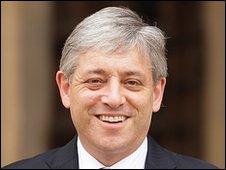Deputy Speakers: Hoyle, Primarolo and Evans elected
- Published

John Bercow said the victors had a hard act to follow
Labour MPs Lindsay Hoyle and Dawn Primarolo and Conservative Nigel Evans have been chosen as Deputy Speakers of the House of Commons.
They were drawn from nine candidates who took part in the first-ever elections for the posts.
Speaker John Bercow said he looked "forward to working with" his new colleagues, who start on Wednesday.
Deputy Speakers preside in the Commons chamber when the Speaker is not present, including the Budget debate.
Their other duties include supervising arrangements for debates in Westminster Hall and proceedings for private members' bills.
The successful candidates replace Sir Alan Haselhurst, Sir Michael Lord and Sylvia Heal.
Eliminations
Mr Bercow said: "The standard set by these three Deputy Speakers will be an inspiration to their successors elected today."
He added: "I congratulate those elected and I look forward to working with them."
After a series of five votes by MPs, in which other candidates were eliminated in stages, Mr Hoyle emerged with 161 backers, with Mr Evans on 133 and Ms Primarolo on 128.
But Mr Evans was the first to gain the 129 votes deemed necessary under the new system.
Two of the positions were allocated to the opposition and one to a member of the governing coalition.
Mr Hoyle has represented Chorley, Lancashire, since 1997, while Ms Primarolo, a former minister, has been MP for Bristol South since 1987.
Mr Evans has represented Ribble Valley, Lancashire, since 1992.
The unsuccessful candidates were Conservatives Geoffrey Clifton-Brown, Roger Gale and Anne McIntosh, and Labour's Tom Clarke, George Howarth and Marsha Singh.
In order to stand for election, MPs had to be sponsored by at least six other MPs. No Liberal Democrats were nominated.
In a break with tradition, Mr Bercow proposed that his deputies be elected shortly after taking on the role of Speaker last year and the plan was approved by the Commons Procedure Committee in March.
They will be elected for the duration of the Parliament but, unlike the Speaker, who becomes an independent after being elected to the role, they remain members of their own parties and will fight general elections on that basis.
Previously deputies had been nominated by the leader of the House of Commons after discussions with the opposition parties.